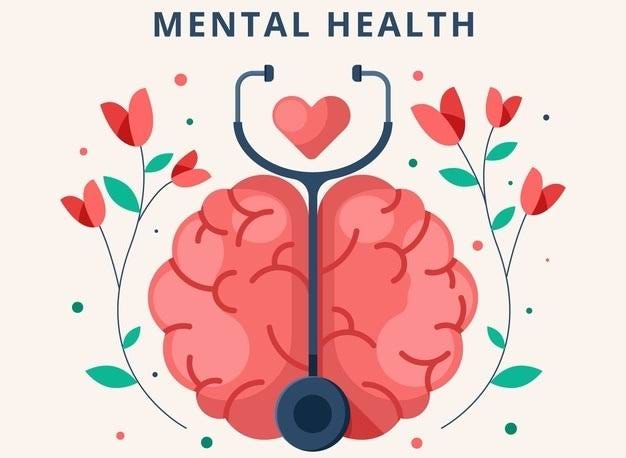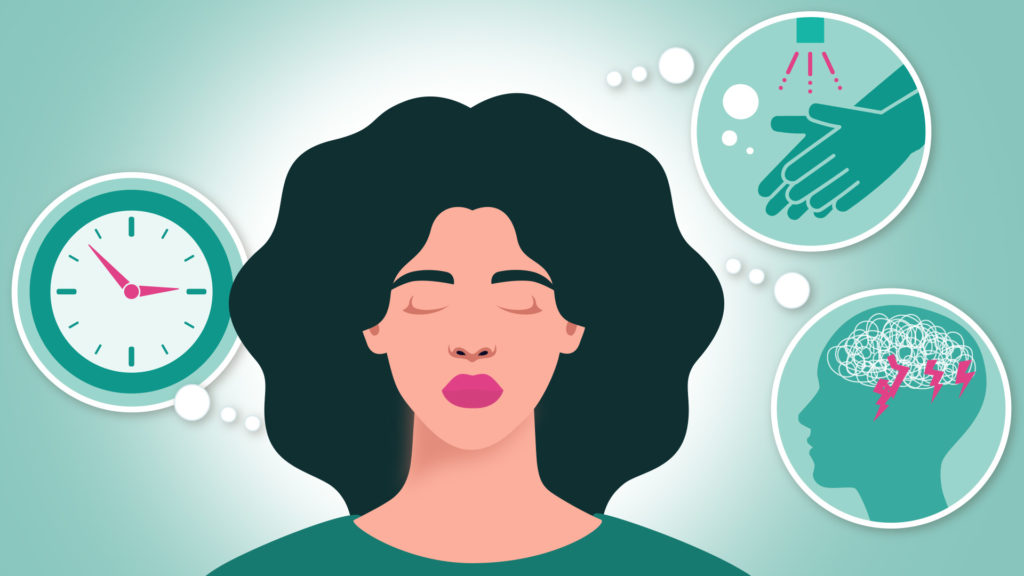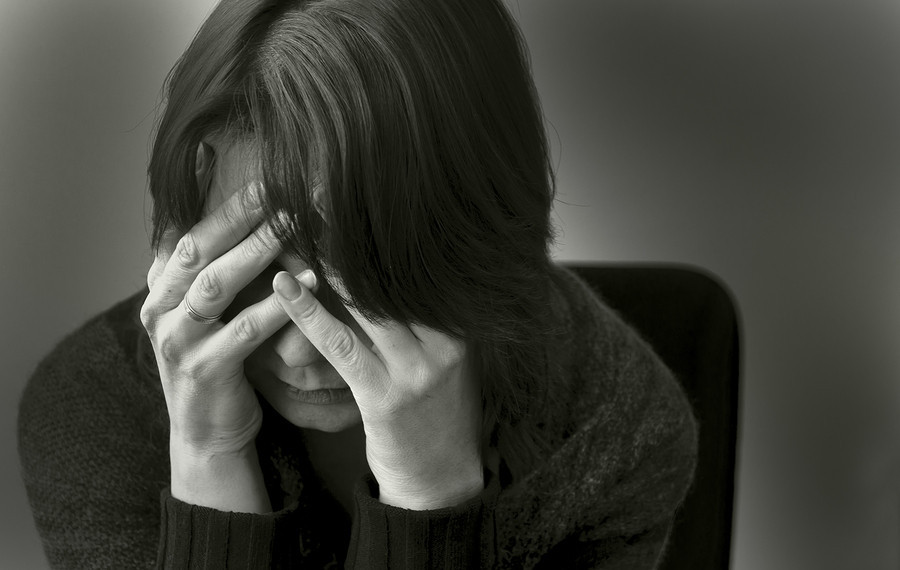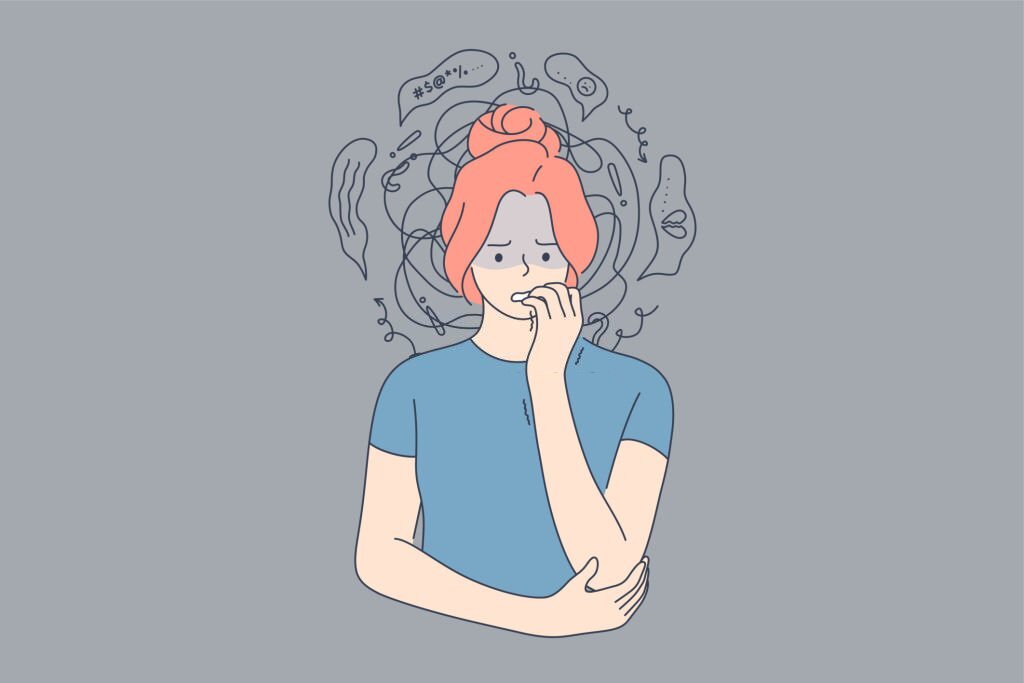User blogs

Burnout is a state of emotional, physical, and mental exhaustion caused by prolonged stress. It can happen to anyone, regardless of their profession or lifestyle. However, those in high-stress jobs, such as doctors, are more prone to burnout. As a mental doctor in Bhopal, I have seen many patients suffering from burnout, and I can tell you that it is a serious issue that needs to be addressed. In this blog post, I will discuss five signs that indicate you might be suffering from burnout.
1) Constant Exhaustion
One of the most common signs of burnout is feeling tired and drained all the time. You may wake up feeling exhausted, even after a good night's sleep. This exhaustion is not just physical but also mental. You may find it hard to concentrate, make decisions, or even remember things. If you constantly feel drained and have no energy, it could be a sign that you are experiencing burnout.
2) Lack of Motivation
Burnout can also cause a lack of motivation. You may find yourself struggling to get out of bed in the morning, dreading going to work, and feeling disinterested in activities that used to bring you joy. This lack of motivation can affect your productivity and performance at work, leading to further stress and frustration.
3) Irritability and Anger
Prolonged stress can also affect your mood and emotions. If you find yourself becoming easily irritated, snapping at people for no reason, or feeling angry and resentful, it could be a sign of burnout. The constant pressure and exhaustion can make you more irritable and affect your relationships with others.
4) Physical Symptoms
Burnout not only affects your mental health but also your physical well-being. You may experience headaches, stomach aches, muscle tension, and other physical symptoms due to the stress and exhaustion. These symptoms may persist, even after taking medication, as the root cause is burnout.
Also Read: OCD Treatment in Bhopal
5) Withdrawal and Isolation
When you are burnt out, you may feel like withdrawing from others and isolating yourself. You may cancel plans with friends and family, avoid social gatherings, and prefer to spend time alone. This isolation can further worsen your mental health and make it harder for you to seek help.

Bipolar disorder is a mental health
condition that affects millions of people worldwide. It is characterized by
extreme shifts in mood, energy levels, and behavior. People with bipolar
disorder may experience periods of intense mania, followed by episodes of
depression. These mood swings can be challenging to manage and can
significantly impact a person's daily life.
Also Read: Mental Doctor in Bhopal
If you or a loved one has been
diagnosed with bipolar disorder, it is essential to seek help from a
professional psychiatrist doctor in Bhopal. A psychiatrist can provide proper
diagnosis and treatment to help manage the symptoms of bipolar disorder. Along
with medication and therapy, here are five coping strategies that can help you
manage bipolar disorder:
1) Establish
a Routine:People with bipolar disorder often struggle with maintaining a regular routine.
However, having a structured daily routine can help manage the symptoms of
bipolar disorder. It can help regulate sleep patterns, maintain a healthy diet,
and provide a sense of stability. Try to wake up and go to bed at the same time
each day, plan your meals and daily activities, and stick to them as much as
possible.
Also Read: Depression Treatment in Bhopal
2) Practice
Mindfulness:Mindfulness is the practice of being fully present in the moment and
accepting one's thoughts and feelings without judgment. It can be a helpful
coping strategy for managing bipolar disorder. Mindfulness techniques, such as
deep breathing, meditation, and yoga, can help reduce stress and promote
relaxation. It can also help improve mood and increase self-awareness, allowing
you to recognize and manage your emotions better.
3) Build a
Support System:Living with bipolar disorder can be challenging, but having a strong
support system can make a significant difference. Reach out to friends and
family members who can provide emotional support and understanding. Join a
support group for people with bipolar disorder to connect with others who are
going through a similar experience. You can also seek support from a therapist
or a psychiatrist doctor in Bhopalwho can provide
professional guidance and support.
4) Monitor
Your Triggers:Triggers are events, situations, or behaviors that can cause a change in
mood or behavior. It is essential to identify your triggers and learn how to
manage them effectively. Common triggers for people with bipolar disorder
include stress, lack of sleep, alcohol or drug use, and major life changes. By
recognizing your triggers, you can take steps to avoid or manage them, reducing
the risk of a mood episode.

When it comes to mental health, there are many misconceptions and stigmas that still exist in our society. This is especially true for depression and anxiety, two of the most common mental health disorders. Despite the growing awareness and understanding of these conditions, there are still many misconceptions surrounding them. As a psychiatric doctor in Bhopal, I have encountered these misconceptions firsthand and it is important to address and debunk them. So, here are five common misconceptions about depression and anxiety.
Also Read: Mental Doctor in Bhopal
1) Depression and anxiety are just temporary feelings: One of the biggest misconceptions about these disorders is that they are just temporary feelings that will eventually go away on their own. This is not the case. Depression and anxiety are serious mental health conditions that require proper treatment and management. They are not just fleeting emotions that can be brushed off. Without proper treatment, these disorders can have a significant impact on a person's life and can even lead to suicidal thoughts.
2) Only weak people experience depression and anxiety: This is a harmful misconception that often prevents people from seeking help. The truth is, anyone can experience depression and anxiety regardless of their strength or character. These disorders are not a sign of weakness, but rather a medical condition that requires proper treatment. It takes a lot of courage and strength to seek help and manage these disorders.
Also Read: OCD Treatment in Bhopal
3) Medication is the only treatment for depression and anxiety: While medication can be an effective form of treatment for depression and anxiety, it is not the only option. Therapy, such as cognitive-behavioral therapy, can also be highly effective in managing these disorders. In fact, a combination of medication and therapy is often the most effective approach. It is important to consult with a psychiatric doctor in Bhopal to determine the best treatment plan for an individual.
4) People with depression and anxiety are just seeking attention: This is a harmful and hurtful misconception that often adds to the stigma surrounding mental health. People with depression and anxiety are not seeking attention, they are seeking help. These disorders are not a choice and can have a significant impact on a person's daily life. It is important to show empathy and support to those who are struggling with these conditions.
5) Children cannot experience depression and anxiety: This is a common misconception that can have serious consequences. Children and teenagers can also experience depression and anxiety. In fact, these disorders are becoming increasingly common among young people.
Also Read: Psychiatric Counselor in Bhopal

Stress has become an inevitable part
of our daily lives. With hectic work schedules, personal responsibilities, and
constantly changing circumstances, it is no surprise that stress has become a
common problem for many people. However, managing stress is crucial for our
mental and physical well-being. As a mental doctor in Bhopal, I have seen the negative effects of
stress on individuals and how it can impact their daily lives. That's why I
want to share 5 effective strategies for managing stress in daily life.
1) Identify
the source of stress:The first step in managing stress is to identify the source
of it. It could be work-related, personal relationships, financial issues, or
even internal pressure to meet certain expectations. Once you have identified
the source, you can then work on finding ways to cope with it effectively.
2) Practice
relaxation techniques:Relaxation techniques such as deep breathing, meditation,
and yoga can help reduce stress levels. These techniques help calm the mind and
body, reducing the physical symptoms of stress such as muscle tension and
headaches. Regular practice of these techniques can also improve overall
well-being and reduce the risk of developing stress-related illnesses.
3) Exercise
regularly:Exercise is not only beneficial for physical health but also for mental health.
It releases endorphins, also known as "feel-good" hormones, which can
help reduce stress and improve mood. Find an exercise routine that works for you,
whether it's going to the gym, taking a walk, or playing a sport. Regular
physical activity can also help improve sleep quality, which is essential for
managing stress.
4)
Prioritize and delegate tasks:Many times, stress is caused by feeling overwhelmed
and having too much on our plate. It is important to prioritize tasks and focus
on the most important ones first. Learn to delegate tasks to others if
possible, and don't be afraid to ask for help when needed. This can help reduce
the burden and pressure you put on yourself, ultimately reducing stress levels.
Also Read: Mental Health Counselor in Bhopal
5) Take
breaks and practice self-care:In our fast-paced lives, we often forget to take
breaks and prioritize self-care. It is crucial to take breaks throughout the
day to relax and recharge. This could be as simple as taking a short walk,
listening to music, or practicing a hobby. Additionally, make time for
self-care activities such as getting enough sleep, eating a healthy diet, and
spending time with loved ones.
Nutrition plays a crucial role in our
overall health, including our mental health. The food we eat not only nourishes
our body but also has a significant impact on our mood, emotions, and behavior.
In recent years, there has been a growing interest in the connection between
nutrition and mental health, and many studies have shown that a healthy diet
can have a positive effect on our mental well-being.
As a psychiatrist in
Bhopal, I have seen firsthand the impact of nutrition on mental health. In my
practice, I have noticed that patients who follow a balanced and nutritious
diet tend to have better mental health outcomes compared to those who have a
poor diet. This observation is supported by numerous studies that have linked
nutrition to various mental health conditions such as depression, anxiety, and
even schizophrenia.
One of the ways nutrition affects
mental health is through the production of neurotransmitters in the brain.
Neurotransmitters are chemical messengers that regulate mood, emotions, and
behavior. Certain nutrients, such as omega-3 fatty acids, B vitamins, and amino
acids, are essential for the production and functioning of these
neurotransmitters. A deficiency in these nutrients can lead to imbalances in
the brain, causing mood swings, irritability, and other mental health issues.
Also Read: Mental Doctor in
Bhopal
Moreover, our gut health also plays a
crucial role in our mental well-being. The gut is often referred to as the
"second brain" because it contains millions of neurons that
communicate with the brain through the nervous system. The gut and brain are
connected through the gut-brain axis, and any disruption in this communication
can lead to mental health problems. A healthy gut microbiome, which is the
community of bacteria in our gut, is essential for maintaining good mental
health. A diet rich in fiber and probiotics can help promote a healthy gut
microbiome, leading to improved mental health.
Also Read: OCD Treatment in
Bhopal
On the other hand, a poor diet, high
in processed and sugary foods, has been linked to an increased risk of mental
health issues. Studies have shown that a diet high in processed foods, such as
fast food and refined carbohydrates, can increase the risk of depression and
anxiety. These foods can cause inflammation in the body, including the brain,
which can affect mood and behavior. Additionally, a diet high in sugar can lead
to blood sugar spikes and crashes, causing mood swings and irritability.

In today's fast-paced world, it's
easy to get caught up in the hustle and bustle of everyday life. With work,
family, and other responsibilities, it can be challenging to find time for
ourselves. However, neglecting our mental health can have serious consequences
on our overall well-being. That's why it's essential to incorporate quick and
easy mental health practices into our busy lives. As a mental doctor in Bhopal, I have seen the positive impact
these practices can have on my patients. In this blog post, I will be sharing
five quick mental health practices that can help you maintain a healthy mind
amidst a busy schedule.
1) Practice
Mindfulness:Mindfulness is the act of being fully present in the moment without
judgment. It can help reduce stress, anxiety, and negative thoughts.
Incorporating mindfulness into your daily routine can be as simple as taking a
few minutes to focus on your breath or paying attention to your surroundings
while walking. It can help you stay grounded and calm in the midst of a hectic
day.
2) Take
Breaks:It's essential to take breaks throughout the day, especially if you have a busy
schedule. Taking short breaks can help you recharge and refocus your mind. It
can be as simple as taking a five-minute walk, listening to your favorite song,
or doing some stretching exercises. These breaks can help prevent burnout and
improve your productivity.
3) Connect
with Others:In today's digital age, it's easy to get caught up in virtual connections
and neglect real-life interactions. However, human connections are crucial for
our mental well-being. Make time to connect with your loved ones, whether it's
a quick phone call or meeting up for a cup of coffee. These interactions can
help boost your mood and provide a sense of support and belonging.
4) Practice
Gratitude:It's easy to focus on the negatives in our lives, especially when we're busy
and stressed. However, taking a few minutes to reflect on the things we are
grateful for can shift our perspective and improve our mental health. You can
start by writing down three things you are thankful for each day or simply
saying them out loud. This practice can help cultivate a more positive mindset
and reduce stressand anxiety.
5) Seek
Professional Help:If you're feeling overwhelmed and struggling to cope with
your busy life, don't hesitate to seek help from a mental doctor in Bhopal. They can provide you with the
necessary support and guidance to manage your mental health.

Mental health is an important part of
overall well-being, and there are a variety of mental health disorders that can
affect people. From anxiety to OCD, understanding the differences between these
conditions can help you better manage your own mental health or assist someone
else who may be struggling with their own issues. To get started on this
journey toward greater understanding, let’s take a deep dive into different
mental health disorders and what sets them apart from one another.
Anxiety is characterized by feelings
of fear or worry that are often accompanied by physical symptoms such as an
increased heart rate and sweating. While everyone experiences some level of
anxiety in certain situations (such as public speaking), those with an anxiety
disorder experience persistent levels for longer periods without any obvious
cause or trigger. Treatment options vary but typically involve
cognitive-behavioral therapy (CBT) combined with medication if needed to reduce
symptoms like panic attacks and insomnia associated with severe cases of
generalized anxiety disorder (GAD). A qualified psychiatrist like Mental Doctor in Bhopalcould provide additional
assistance when dealing specifically with GAD-related issues.
On the other hand,
obsessive-compulsive disorder (OCD) involves intrusive thoughts that neither
lead to compulsive behaviors designed to alleviate stress caused by those
thoughts— even though they do not actually make sense logically nor offer real
relief from distressful emotions experienced due to said intrusive thought
patterns. Common compulsions include repetitive counting rituals, excessive
cleaning, hoarding items, checking locks multiple times before leaving home,
etc., which all serve only to temporarily distract individuals from their
obsessions while providing no lasting solutions. For treatment plans involving
CBT/medication combinations to work best in treating OCD, many psychiatrists
also recommend incorporating mindfulness practices into daily life since it
helps patients become more aware and accepting towards their condition instead
of trying hard to fight against it.
In conclusion, both Anxiety& OCDhave commonalities yet distinct
differences exist between them; thus, recognizing signs/symptoms associated
with each type allows us to identify appropriate treatments available so we can
move forward confidently in our lives regardless of how many challenges might
come along the way!
Depression is one of the most
common mental disorders faced by teenagers and kids. If you are a teenager or a
kid and you are facing such symptoms like sadness, loss of interest in the
activities, anger, anxiety and many more then you are not alone.
Many people are suffering from
such mental illness which leads to severe depression and if left untreated it
can turn into a major problem. So, it is better to seek depression
treatment in Bhopalat the right time.
Depression is the condition where
you feel very sad about some specific event that has happened in your life. In
this article, I will share some effective ways that will help you to get rid of
depression and live a happy and healthy life.
Depression is an illness that is
caused due to a number of reasons like stressful life events, low self-esteem,
problems with friends and family, etc. So, you need to get rid of such things
before it turns into a real mental disorder.
Here are some tips that will help
you to get rid of depression:
Talk
to your parents
When you are facing depression
then your parents are the first person you should talk to. Don’t be shy, just
tell them how you feel and if they can do anything then they will help you the
most. You can even ask your parents to change the house or school if you feel
that the stress level is too high for you. If you are feeling awkward in
talking to your parents, you can always opt for a mental doctor in Bhopal.
Make
sure that you eat well and try to stay fit
In order to keep your body active
you need to eat well. Try to eat something light like fruits and vegetables. If
you don’t feel like eating, then take a walk in the park or play any sport with
your friends. If you still don’t feel like doing anything then you can just
sleep for hours.
Try
to understand the situation
It is not easy to understand the
situation but it is important that you should try to understand it. You should
know that there are many other people who are also suffering from depression
and it is not fair that you should bear the entire burden alone.
Get
involved in social activities
It is not easy to deal with the
depression, but it is important that you should join some social activities
with your friends. You need to make yourself busy with friends so that you can
forget about your problems.
Conclusion:
Depression is one of the most
common mental disorders faced by teenagers and kids. It can lead to severe
depression if you ignore it. So, I hope the tips mentioned above will help you
to get rid of this mental disorder. If not, do not shy away from seeking help
from a psychiatrist
in Bhopal.
A lot of people feel like there are not
enough easy things they can do to help relieve their depression.
But the truth is, there are actually a lot
of things you can do. All you have to do is just take action. So without
further ado, here are six simple things you can do every day to help you feel
better. Note that these tips are highly effective and suggested by a mental doctor in Bhopal.
1.
Write a Journal
Writing is one of the best ways to process
what is going on in your life. And if you are feeling sad or depressed, it’s
also a great way to let go of those feelings.
You can do this by writing down what you
are thinking about or feeling. This will give you a chance to put down thoughts
and feelings you might not have been able to express otherwise. You can write
about how you are feeling, what you are thinking, what you want, or anything
else that is going through your mind.
Once you have finished writing, you can
read over what you have written. You can even turn this journal into a book. If
you have a notebook you can write in, this is a great option. You can use your
journal as a sort of diary, where you can record your thoughts and feelings.
2.
Exercise
Exercise helps to relieve stress. And if
you are feeling stressed out, exercise is a great way to help. Not only will it
make you feel better overall, but it can help you with depression.
There are many ways to exercise, whether
you like to lift weights or do yoga. You can also play sports or take a hike.
Whatever you choose, just do something that gets your blood pumping.
3.
Watch TV Shows
Watching TV shows is a great way to relieve
stress. You don’t have to worry about making conversation; you can just sit
back and watch.
If you like watching comedy, you can watch
shows like Seinfeld, The Big Bang Theory, or 30 Rock. If you like watching
movies, you can watch The Walking Dead, Empire, or American Horror Story.
While TV shows are great for relieving
stress, they are also a great way to relax. If you are feeling stressed, you
should try to find a show that has some tension. Or you can even use shows like
30 Rock to help you unwind and relax.
4.
Listen to Music
Music is one of the best ways to relieve
stress. And if you are feeling depressed, music can help you get out of it. You
can listen to music as background noise, or you can listen to specific songs.
If you like listening to music in general,
there are a lot of great songs out there. If you are feeling more specific, you
can try songs by Drake, Bruno Mars, Beyoncé, Katy Perry, Adele, or even Taylor
Swift.
5.
Play Games
Playing video games is another great way to
relax. It’s a great way to spend time with friends, and it can also help you
relieve stress.
There are many different types of games
that you can play. Whether you like playing FPS games like Call of Duty or
racing games like Need for Speed, you can find a game that will help you to
relieve stress.
6.
Take a Nap
Taking a nap is one of the best ways to
relieve stress. If you are feeling stressed out, getting a good nap is a great
way to get back on track, suggests the best psychiatrist in Bhopal.
A lot of people feel like naps are boring,
but if you have a lot of work to do, a nap can help you get it done. You can
even use your nap to help you relax before going to sleep at night.



